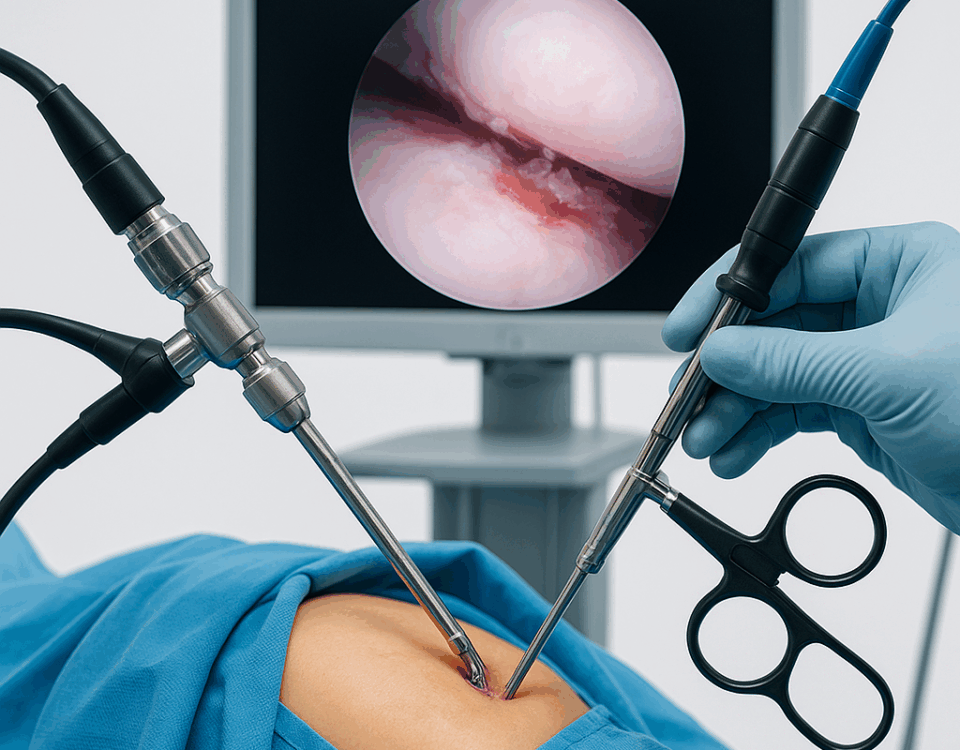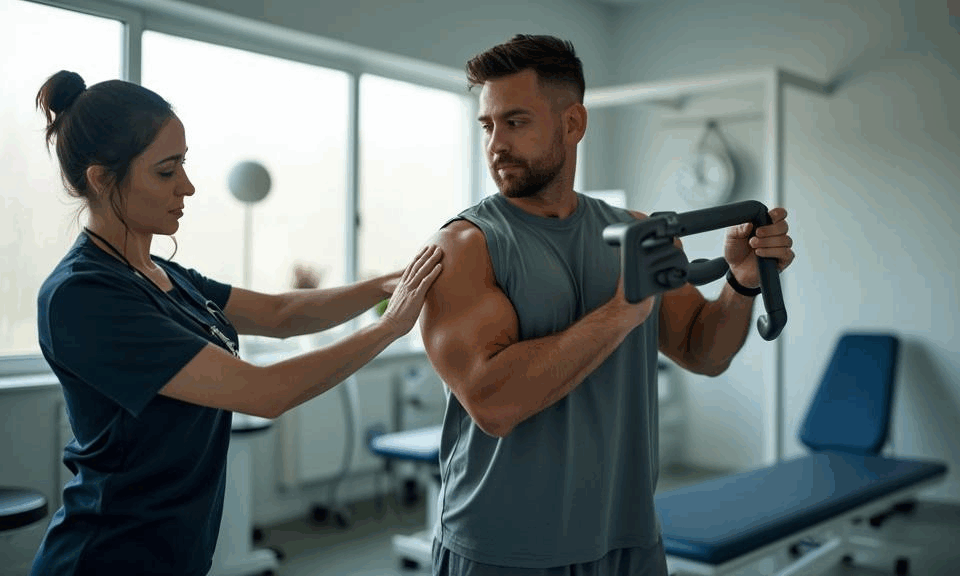
Rotator cuff surgery is a standard procedure for individuals experiencing severe shoulder pain or injury, aiming to restore function and alleviate discomfort.
Key Takeaways
- Rotator cuff surgery requires careful evaluation and proper timing for optimal results.
- Modern arthroscopic techniques offer faster recovery times than traditional open surgery.
- Physical therapy is crucial for achieving successful surgical outcomes and maintaining long-term shoulder health.
- Board-certified specialists with fellowship training provide superior surgical expertise.
- Central Florida patients have access to advanced treatment options at Florida Sports Injury.
Rotator Cuff Surgery: Advanced Treatment Options in Central Florida
Understanding Rotator Cuff Surgery
Rotator cuff surgery becomes necessary when conservative treatments fail to restore shoulder function and alleviate pain. Specifically, this surgical procedure repairs torn tendons in the rotator cuff, which consists of four muscles that stabilize and move the shoulder joint. At Florida Sports Injury & Orthopedic Institute, our fellowship-trained surgeons specialize in both arthroscopic and open surgical techniques to restore optimal shoulder function.
Meanwhile, the rotator cuff plays a crucial role in maintaining shoulder stability and mobility. Consequently, when tears occur, whether from acute injury or gradual wear, surgical intervention may be required to restore strength and eliminate chronic pain. Furthermore, modern surgical techniques have revolutionized outcomes, with minimally invasive arthroscopic procedures offering reduced recovery times and improved patient satisfaction.
Concise Answers
- Surgery is recommended when conservative treatment fails after 3-6 months
- Arthroscopic techniques offer smaller incisions and faster healing
- Full recovery typically takes 4-6 months with proper rehabilitation
- Success rates exceed 90% when performed by experienced surgeons
- Post-surgical physical therapy is essential for optimal outcomes
Signs You May Need Rotator Cuff Surgery

Importantly, complete rotator cuff tears rarely heal without surgical repair, especially in active individuals. Therefore, Dr. Amit Varma, our double-board-certified orthopedic surgeon, evaluates each patient’s specific condition using advanced imaging techniques to determine the most appropriate treatment approach. In fact, factors such as tear size, patient age, activity level, and overall health status influence surgical recommendations.
Similarly, the American Academy of Orthopaedic Surgeons emphasizes that early surgical intervention for complete tears often yields better outcomes than delayed treatment, particularly in younger, more active patients.
Types of Rotator Cuff Surgery Procedures
Arthroscopic Rotator Cuff Repair
On the other hand, arthroscopic surgery represents the gold standard for most rotator cuff repairs. Notably, this minimally invasive technique utilizes small incisions and specialized instruments to reattach torn tendons to their respective bones. As a result, the procedure typically takes 1-2 hours and offers numerous advantages, including reduced tissue trauma, minimal scarring, and faster recovery times.
Open Surgical Repair
Alternatively, large or complex tears may require open surgical repair through a larger incision. In contrast, this approach provides direct visualization of the tear and its surrounding structures, enabling more extensive reconstruction when necessary. Ultimately, Dr. Varma’s expertise in both techniques ensures patients receive the most appropriate surgical approach for their specific condition.
Reverse Shoulder Replacement
However, for severe rotator cuff tears with arthritis or in older patients with irreparable tears, reverse shoulder replacement may be recommended. In this case, this advanced procedure reverses the standard ball-and-socket configuration, allowing the deltoid muscle to compensate for the damaged rotator cuff.
Pre-Surgery Preparation
Proper preparation initially has a significant impact on surgical outcomes and recovery success. Therefore, pre-operative evaluation includes comprehensive medical clearance, imaging studies, and a detailed discussion of expectations. Furthermore, patients should discontinue blood-thinning medications as directed and arrange for assistance during the initial recovery period.
Moreover, physical conditioning before surgery, often referred to as “prehabilitation,” can enhance post-surgical outcomes. Indeed, the Mayo Clinic research demonstrates that patients who maintain shoulder flexibility and overall fitness before surgery usually experience faster recoveries.
Recovery Timeline and Expectations
Generally, recovery from rotator cuff surgery occurs in distinct phases, each with specific goals and restrictions. Therefore, understanding this timeline helps patients set realistic expectations and actively participate in their recovery process.
Begin with Phase 1 (0-6 weeks): Protection and Healing
- Sling immobilization to protect the repair
- Gentle passive range of motion exercises
- Pain management and inflammation control
- Gradual introduction of daily activities
Phase 2 (6-12 weeks): Mobility Restoration
- Progressive range of motion exercises
- Elimination of the sling for most activities
- Introduction of light strengthening exercises
- Return to driving and desk work
Phase 3 (3-6 months): Strength and Function
- Progressive strengthening program
- Sport-specific or work-related activities
- Full range of motion achievement
- Return to normal activities
Consequently, the success of rotator cuff surgery depends heavily on patient compliance with rehabilitation protocols. In particular, Dr. Peter Shekailo, our fellowship-trained specialist, emphasizes that rushing the recovery process can compromise surgical results and lead to re-injury.
Physical Therapy After Rotator Cuff Surgery

Initially, early therapy focuses on protecting the surgical repair, preventing stiffness, and maintaining mobility in unaffected joints. Later, advanced phases incorporate strengthening exercises, functional training, and sport-specific movements when appropriate. Finally, integrating modern rehabilitation techniques, including manual therapy and movement analysis, optimizes outcomes.
Success Rates and Outcomes
Remarkably, modern rotator cuff surgery achieves excellent outcomes when performed by experienced surgeons. According to studies published in the Journal of Bone and Joint Surgery, success rates exceed 90% for appropriate candidates. Nevertheless, factors influencing outcomes include tear size, patient age, tissue quality, and adherence to rehabilitation protocols.
In our experience, Dr. William Athans, our fellowship-trained sports medicine specialist, reports that patients typically achieve 85-95% of normal shoulder function following successful rotator cuff repair. Often, pain relief is dramatic, with most patients experiencing significant improvement within the first few months post-surgery.
Similarly, long-term studies demonstrate that surgical repair provides durable results, with most patients maintaining good function and pain relief for many years. However, success depends on realistic expectations and commitment to the rehabilitation process.
Choosing the Right Rotator Cuff Surgeon

Key factors to consider when choosing a surgeon include:
- Board certification in orthopedic surgery
- Fellowship training in sports medicine or shoulder surgery
- Experience with both arthroscopic and open techniques
- Access to advanced imaging and surgical technology
- Comprehensive rehabilitation programs
The American Board of Orthopaedic Surgery verifies surgeon credentials and board certification status. Dr. Amit Varma’s double-board certification and sports fellowship training demonstrate the highest level of surgical expertise.
FSI vs Competitors Comparison
| Feature | Florida Sports Injury | Competitor A | Competitor B |
|---|---|---|---|
| Board-Certified Surgeons | ✓ Double-certified | ✓ Single certification | ✓ Basic certification |
| Fellowship Training | ✓ Sports Medicine | ✓ General Ortho | Limited |
| Arthroscopic Expertise | ✓ Advanced techniques | Basic arthroscopy | Limited options |
| Rehabilitation Program | ✓ Comprehensive on-site | Referral-based | Basic therapy |
| Technology | ✓ Latest equipment | Standard | Outdated |
| Success Rates | >90% | 85% | 80% |
| Wait Times | Same/next day | 2-3 weeks | 4-6 weeks |
Local Rotator Cuff Surgery Options in Central Florida
Central Florida residents have access to world-class rotator cuff surgery through Florida Sports Injury & Orthopedic Institute. Our Clermont location serves patients throughout Lake and Orange counties and surrounding areas, offering convenient access to advanced orthopedic care.
Florida Sports Injury & Orthopedic Institute
Address: 1925 Don Wickham Drive, Clermont, FL 34711
Phone: (352) 404-8956
Service Areas: Clermont, Winter Garden, Leesburg, Mount Dora, Apopka, Orlando metro
Our facility offers comprehensive care, including diagnostic imaging, surgical services, and rehabilitation programs, all under one roof. This integrated approach ensures continuity of care and optimal patient outcomes. Dr. Matthew Lee Welsh’s fellowship training in extremity surgery complements the expertise of our shoulder specialists.
Frequently Asked Questions About Rotator Cuff Surgery
How long does rotator cuff surgery take?
Most arthroscopic rotator cuff repairs take 1 to 2 hours, depending on the tear’s complexity. Open procedures may require additional time for extensive reconstruction.
Will I need to wear a sling after surgery?
Yes, patients typically wear a sling for 4-6 weeks to protect the surgical repair and allow proper healing.
When can I return to work after rotator cuff surgery?
Desk workers often return within 1-2 weeks, while manual laborers may need 3-6 months, depending on job requirements.
What are the risks of rotator cuff surgery?
Risks include infection, stiffness, nerve injury, and re-tear. However, serious complications are rare when experienced surgeons perform surgery.
How successful is rotator cuff surgery?
Success rates exceed 90% for appropriate candidates when performed by fellowship-trained surgeons with proper rehabilitation.
Ready to Schedule Your Rotator Cuff Surgery Consultation?
Don’t let shoulder pain limit your activities. Our fellowship-trained surgeons are ready to help you return to an active, pain-free lifestyle.
Schedule Your Consultation Today
Same-day appointments available • 90%+ success rates • Comprehensive care









Most Commented